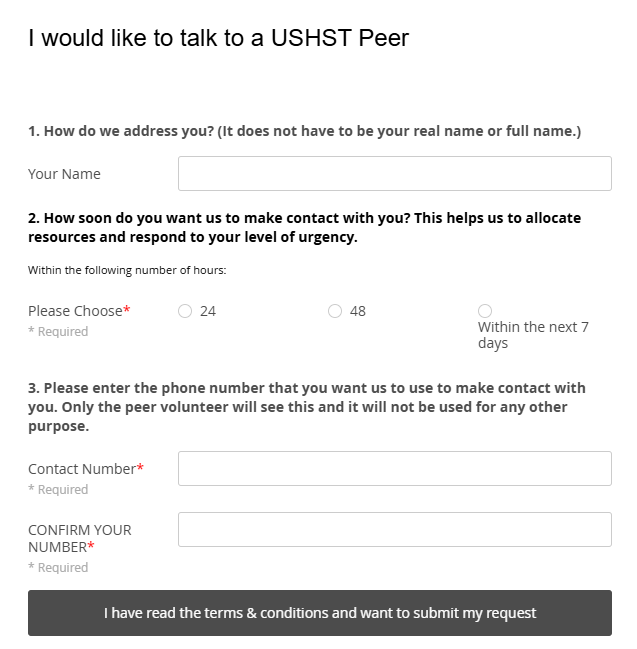When we think “fit to fly,” eyesight, hearing, and blood pressure come to mind. But mental fitness is just as critical. Fatigue, stress, exposure to traumatic events, and everyday pressures can erode cockpit judgment and safety of flight.
USHST Peer Pilot Program
Airlines have offered peer‑support programs for years, saving countless lives. Now, thanks to the US Helicopter Safety Team (USHST), the rotorcraft community has its own: the Peer Pilot Program—a brand‑new, completely confidential, free resource for everyone in vertical aviation that does not need to be disclosed on your FAA medical.
- Who it is for: Pilots, maintenance technicians, and support crew.
- How it works: Pairs you with a trained peer who understands the unique stressors of our industry and is ready to listen without judgment.
- Why it matters: Talking to someone who “gets it” can be the difference between staying mentally fit and letting stress spiral into poor decisions or career setbacks.
“Reaching out isn’t a sign of weakness. It’s a mark of resilience.” – Bruce Webb, Airbus Helicopters, VAI Spotlight on Safety: Are You Mentally Fit to Fly?
Watch the Spotlight on Safety Video
Airbus Helicopters pilot Bruce Webb walks through mental‑health risk factors, self‑assessment tips, and the new Peer Program in the latest VAI Spotlight on Safety video:
Feel free to share the video link with students, colleagues, or anyone who could use a reminder that it is okay to ask for help.
Confidential & Non-Reportable
Using the Peer Pilot Program is entirely confidential. Because interactions are peer-to-peer support and not medical treatment, you do not need to report your participation to the FAA or to your Aviation Medical Examiner (AME) when you renew your medical certificate.
What peers can and cannot do
- Peers are fellow pilots, not licensed psychologists, therapists, lawyers, or doctors. They cannot diagnose, treat, prescribe, determine your fitness to fly, or make formal referrals on your behalf.
- Every peer has additional training in pilot wellbeing and is backed by independent psychologists from the Centre for Aviation Psychology.
- Normal duty-of-care still applies: if a conversation reveals a significant threat to you or to public safety, they may have to escalate it.
What can you talk about?
Anything that is weighing on you: psychological wellbeing, major life changes, relationship strains, fatigue, work-life balance, bereavement, simulator or checkride nerves, career questions, colleague concerns, financial worries, health anxieties, and more.
Not for Emergencies!
This service DOES NOT provide assistance in the event of an emergency.
For personal support or any urgent people issues, please contact your employee hotline, human resources manager, chief pilot, union representative, known emergency contact numbers, or your local emergency services. In the United States you can also call 988 for the Suicide and Crisis Lifeline or 911 for immediate emergencies.
Volunteer as a Peer Counselor
Ready to give back? The program is actively recruiting volunteer peers and full training will be provided. Pilots Interested in becoming a Peer Pilot volunteer can contact the USHST at info@USHST.org, please put PPP Volunteer in the subject.
Extra Resources
- USHST Peer Program Resource Library: Mental health resources and self‑help tools.
- Resilience Hub (Self‑Help Modules): Self‑paced modules to build personal, professional, and career resilience. Operated independently by the Centre for Aviation Psychology; USHST only receives membership‑validation data and aggregated usage patterns, never individual details.
- VAI Article VAI Spotlight on Safety: Are you mentally fit to fly?
- Join USHST (free membership): Even if you never need peer support, joining gives you access to a wealth of rotorcraft‑specific safety content including safety enhancements publications, safety newsletters, safety presentations and webinars, and data‑driven accident trend reports.
Keep the Conversation Going
Share this post, forward the video, and bring up mental fitness and the USHST Peer Pilot Program in your next safety briefing. There is also a poster you can download and print to put up in your pilot lounge, briefing room, etc.
Feedback
Let us know in the comments below if you have any other resources or advice on this topic?



